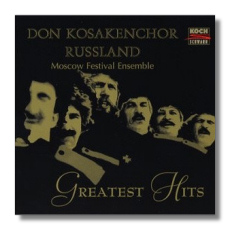
The Internet's Premier Classical Music Source
Related Links
- Latest Reviews
- More Reviews
-
By Composer
-
Collections
DVD & Blu-ray
Books
Concert Reviews
Articles/Interviews
Software
Audio
Search Amazon
Recommended Links
Site News
 CD Review
CD Review
The Choir of the Don Cossacks

Greatest Hits
The Choir of the Don Cossacks, Russia
Moscow Festival Ensemble/Marcel Nicolajevich Verhoeff
Koch-Schwann 3-1726-2 DDD 59:22
During the Cold War years, Soviet traditional music groups such as the Osipov Balalaika Ensemble, the Red Army Chorus, and the Don Cossacks Choir served as musical ambassadors to the West. Then, as the Soviet Union fell, so fell many of its artistic institutions, including the Don Cossacks Choir.
Fortunately, the Don Cossacks Choir was founded anew in 1992. Its members claim descent from ancient Cossack families that inhabited regions associated with the Don, Kuban, and Terek Rivers. Through recordings and tours, they have sustained a presence on the professional music scene, even when the financial situation in post-Soviet Russia has been less than luxurious.
The typical sound of the all-male Don Cossack Choir is a soloist (sometimes a bass-baritone, sometimes a tenor) accompanied by the impressive sound – part drone and part vocalise – of the choristers. Particularly in the faster numbers, the entire choir gets to sing – or should I say "bark out"? – the lyrics. The performances are lusty and emotional, and shouts or shrill whistling add the requisite folksy touch. On this CD, the Don Cossack Choir is accompanied – as it often is – by the Moscow Festival Ensemble, six players who play traditional instruments such as the domra, the gusli, the bayan, and the balalaika.
As the title suggests, this recording contains exactly the repertoire one would expect the Don Cossacks Choir to perform. The CD opens with "Black Eyes," continues with favorites including "Stenka Razin," and "The Volga Boatman's Song," and ends with a rousing medley in which "Kalinka" figures prominently. Koch-Schwann doesn't make this clear, but, judging from the copyright dates, the selections appear to have been taken from a number of recordings made during the mid-1990s. In spite of this, the engineering and the performance styles remain consistent. The engineers give prominence to soloists, both vocal and instrumental, when their opportunities arise. Otherwise, the engineering is duly atmospheric.
There are 16 songs on this CD. Koch-Schwann provides either texts or a synopsis for each. These are in German and English, although the songs are sung in Russian, of course.
Pour yourself a vodka, slice yourself a beet, and pop this in your CD player.
Copyright © 2002, Raymond Tuttle


















